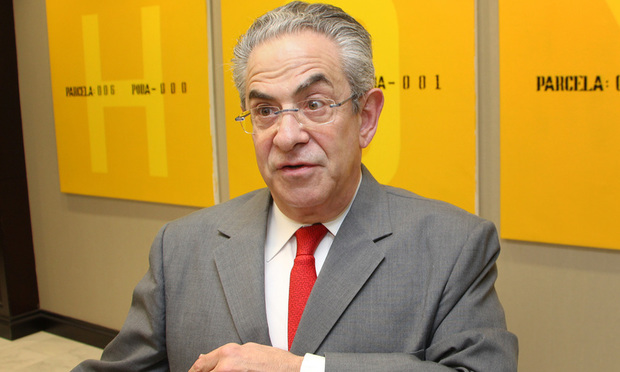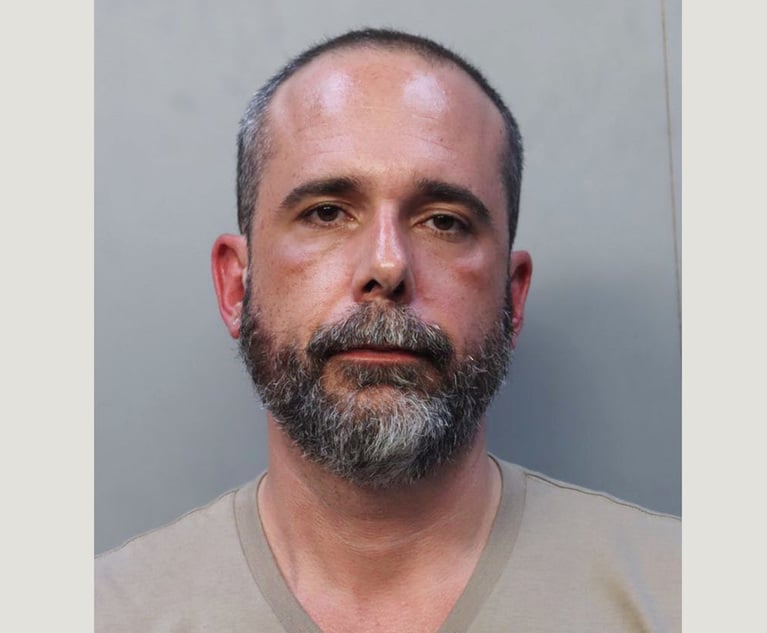 Alan Kluger.
Alan Kluger.South Florida Midsize Law Firms Find Room for Fee Options
There's been lots of talk in the legal profession about alternative fee arrangements, and midsize law firms in South Florida have carved out some space beyond hourly rates.
January 09, 2018 at 04:31 PM
6 minute read
The buzz about alternative fee arrangements has gotten louder in recent years, and many midsize law firms in South Florida have carved out space for something other than the straight billable hour.
“It's becoming more and more of a topic, especially in big commercial cases, where it really wasn't before,” said Miami commercial litigator Alan Kluger, co-founder of the 32-attorney Kluger Kaplan. “Clients are more receptive than they used to be.”
The field of possibilities is open on the client side.
“Every single client, with the exception of maybe the Fortune 50, are potential clients to do alternative fee agreements, and the main thing they tell you is the shifting of the risk solely from the client to the client and the lawyers makes them happy,” he said.
But opinion is split on the willingness of clients to switch away from billable hours to AFAs.
Gary Rosen, managing shareholder of the 92-attorney Becker & Poliakoff, said he attends a lot of professional conferences, and “there's been a lot of talk about AFAs in the past 10 years generally.”
“In reality, AFAs have not grown as dramatically and have not become as significant a component of the overall legal landscape as many have predicted, and the reason is it's not that lawyers are uncomfortable with it. For the most part, it's clients who are uncomfortable with it,” he said. “Clients have shown a reticence to move much more significantly into the AFA environment.”
Clients like the idea of predictable legal fees, and alternative arrangements are keyed more to specific clients than practice areas, said real estate litigator Ryan Gesten of the 21-attorney Shapiro, Blasi, Wasserman & Hermann in Boca Raton.
“I've been practicing 17 years. I've handled 1,000 matters on contingency,” he said. When considering a request for alternative fees, “it's almost like we know it when we see it.”
Attorneys at South Florida midsize firms said alternative fees represent as little as 10 percent of one attorney's revenue and as high as 80 percent of cases, with litigation being a common practice area for AFAs.
The types of cases most likely to foster alternative fees at Kluger's litigation firm are third-party and bad faith insurance claims, legal malpractice claims and breach of warranty claims.
“Those cases get resolved because it's money. It's just money,” he said.
WHO DECIDES?
Rebecca Bratter, deputy managing partner of 215-attorney Greenspoon Marder in Fort Lauderdale, estimated the rate of AFAs in litigation may be as high as 40 percent at her fast-growing firm.
“To the extent that lawyers are asking, the vast majority are approved,” she said. “The lawyers know they can come to us anytime and bounce ideas off of us.”
Partner Joseph Serota, former managing partner at Weiss Serota Helfman Cole & Bierman in Coral Gables, said he reviews all fee proposals at the government and business firm.
“Even though we're 65 lawyers, we decided some years ago that we need one person who ultimately has approval of fee agreements, so I've been doing it since day one, 27 years ago,” he said. “We give our lawyers a lot of authority, but they know there's going to be a single person who has authority to approve.”
Serota includes reduced hourly rates in his definition of alternative fees.
“I'm not, I would say, a fee snob, meaning that I don't take the position that we must get $600 an hour or we're not taking the case or matter,” he said. “My philosophy is, 'Can we make money on this matter with this fee and this staffing?' ”
Kluger Kaplan has a standing three-member review committee, and backing is needed from two members. Decisions are reached in a week or less.
FLAT FEES
Firm leaders said AFAs are most likely to be seen on short-term assignments, such as a flat fee for a case analysis, to look at a nondisclosure agreement or to perform a land-use analysis for a potential lender.
“But when it starts getting into a project where clearly you're going to be spending a large amount of time, then you get into the hourly billing,” Perry Sofferman, a Fort Lauderdale shareholder at the 74-lawyer Fowler White Burnett. The transactions and intellectual property and international attorney estimates flat fees account for about 10 percent of his revenue.
Serota said institutional clients are a large percentage of the firm's business, and “you could say that every one of them has some sort of an alternative fee arrangement.”
Kluger breaks litigation alternative fees into five types:
- Pure contingency
- Reverse contingency factoring in a percentage of savings
- Partial contingency combining a reduced hourly rate with a portion of the recovery
- Reverse partial contingency combining hourly rates with a kicker if a settlement comes in below projections
- Fixed fees.
Becker & Poliakoff has seven core practice groups, and one of them, the government law and lobbying practice, has operated for 25 years on an alternative-fee basis. Government relations work is a significant component of firm revenue. The group generally charges a flat fee billed monthly for a period of months or year-to-year.
The firm represents thousands of community associations, and ”cash flow is a major consideration” for them, Rosen said.
“The firm takes the risk that they could recover absolutely nothing,” he said. “In exchange for that risk, the law firm is entitled to a premium.”
Firms have to maintain a comfort level to run with alternative fees.
“Contingency by nature is less predictable than hourly arrangements,” Rosen said. “My lawyers and my staff do enjoy getting paid twice a month with regularity, and as a result from a management perspective predictability of cash flow is kind of important.”
This content has been archived. It is available through our partners, LexisNexis® and Bloomberg Law.
To view this content, please continue to their sites.
Not a Lexis Subscriber?
Subscribe Now
Not a Bloomberg Law Subscriber?
Subscribe Now
NOT FOR REPRINT
© 2025 ALM Global, LLC, All Rights Reserved. Request academic re-use from www.copyright.com. All other uses, submit a request to [email protected]. For more information visit Asset & Logo Licensing.
You Might Like
View All
Auto Dealers Ask Court to Pump the Brakes on Scout Motors’ Florida Sales
3 minute read
Saul Ewing Loses Two Partners to Fox Rothschild, Marking Four Fla. Partner Exits in Last 13 Months
3 minute read
Trending Stories
- 1Jury Awards $3M in Shooting at Nightclub
- 2How Clean Is the Clean Slate Act?
- 3Florida Bar Sues Miami Attorney for Frivolous Lawsuits
- 4Donald Trump Serves Only De Facto and Not De Jure: A Status That Voids His Acts Usurping the Power of Congress or the Courts
- 5Georgia Hacker Pleads Guilty in SEC X Account Scam That Moved Markets
Who Got The Work
J. Brugh Lower of Gibbons has entered an appearance for industrial equipment supplier Devco Corporation in a pending trademark infringement lawsuit. The suit, accusing the defendant of selling knock-off Graco products, was filed Dec. 18 in New Jersey District Court by Rivkin Radler on behalf of Graco Inc. and Graco Minnesota. The case, assigned to U.S. District Judge Zahid N. Quraishi, is 3:24-cv-11294, Graco Inc. et al v. Devco Corporation.
Who Got The Work
Rebecca Maller-Stein and Kent A. Yalowitz of Arnold & Porter Kaye Scholer have entered their appearances for Hanaco Venture Capital and its executives, Lior Prosor and David Frankel, in a pending securities lawsuit. The action, filed on Dec. 24 in New York Southern District Court by Zell, Aron & Co. on behalf of Goldeneye Advisors, accuses the defendants of negligently and fraudulently managing the plaintiff's $1 million investment. The case, assigned to U.S. District Judge Vernon S. Broderick, is 1:24-cv-09918, Goldeneye Advisors, LLC v. Hanaco Venture Capital, Ltd. et al.
Who Got The Work
Attorneys from A&O Shearman has stepped in as defense counsel for Toronto-Dominion Bank and other defendants in a pending securities class action. The suit, filed Dec. 11 in New York Southern District Court by Bleichmar Fonti & Auld, accuses the defendants of concealing the bank's 'pervasive' deficiencies in regards to its compliance with the Bank Secrecy Act and the quality of its anti-money laundering controls. The case, assigned to U.S. District Judge Arun Subramanian, is 1:24-cv-09445, Gonzalez v. The Toronto-Dominion Bank et al.
Who Got The Work
Crown Castle International, a Pennsylvania company providing shared communications infrastructure, has turned to Luke D. Wolf of Gordon Rees Scully Mansukhani to fend off a pending breach-of-contract lawsuit. The court action, filed Nov. 25 in Michigan Eastern District Court by Hooper Hathaway PC on behalf of The Town Residences LLC, accuses Crown Castle of failing to transfer approximately $30,000 in utility payments from T-Mobile in breach of a roof-top lease and assignment agreement. The case, assigned to U.S. District Judge Susan K. Declercq, is 2:24-cv-13131, The Town Residences LLC v. T-Mobile US, Inc. et al.
Who Got The Work
Wilfred P. Coronato and Daniel M. Schwartz of McCarter & English have stepped in as defense counsel to Electrolux Home Products Inc. in a pending product liability lawsuit. The court action, filed Nov. 26 in New York Eastern District Court by Poulos Lopiccolo PC and Nagel Rice LLP on behalf of David Stern, alleges that the defendant's refrigerators’ drawers and shelving repeatedly break and fall apart within months after purchase. The case, assigned to U.S. District Judge Joan M. Azrack, is 2:24-cv-08204, Stern v. Electrolux Home Products, Inc.
Featured Firms
Law Offices of Gary Martin Hays & Associates, P.C.
(470) 294-1674
Law Offices of Mark E. Salomone
(857) 444-6468
Smith & Hassler
(713) 739-1250







